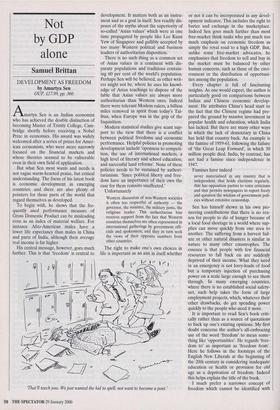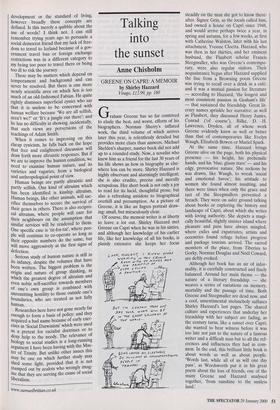Not by GDP alone
Samuel Brittan
DEVELOPMENT AS FREEDOM by Amartya Sen OUP, 117.99, pp. 360 Anartya Sen is an Indian economist who has achieved the double distinction of becoming Master of Trinity College, Cam- bridge shortly before receiving a Nobel Prize in economics. His award was widely welcomed after a series of prizes for Amer- ican economists, who were more narrowly focused on the financial markets and whose theories seemed to be vulnerable even in their own field of application.
But what Sen most wants and needs is not vague warm-hearted praise, but critical understanding. The focus of his latest book is economic development in emerging countries; and there are also plenty of pointers for those parts of the world that regard themselves as developed.
To begin with, he shows that the fre- quently used performance measure of Gross Domestic Product can be misleading even as an index of material welfare. For instance Afro-American males have a lower life expectancy than males in China and parts of India, although their average real income is far higher.
His central message, however, goes much further. This is that 'freedom' is central to development. development. It matters both as an instru- ment and as a goal in itself. Sen readily dis- poses of the myths about the superiority of so-called 'Asian values' which were at one time propagated by people like Lee Kuan Yew of Singapore and gullibly accepted by too many Western political and business leaders of authoritarian disposition.
There is no such thing as a common set of Asian values in a continent with dis- parate populations and traditions contain- ing 60 per cent of the world's population. Perhaps Sen will be believed, as other writ- ers might not be, where he uses his knowl- edge of Asian teachings to dispose of the fable that Asian values are always more authoritarian than Western ones. Indeed there were tolerant Moslem rulers, a billion miles removed in spirit from today's Tal- iban, when Europe was in the grip of the Inquisition.
Modern statistical studies give scant sup- port to the view that there is a conflict between political freedoms and economic performance. Helpful policies in promoting development include 'openness to competi- tion, the use of international markets, a high level of literacy and school education, and successful land reforms'. None of these policies needs to be sustained by authori- tarianism. 'Since political liberty and free- dom have an importance of their own the case for them remains unaffected.'
Unfortunately Western discussion of non-Western societies is often too respectful of authority — the governor, the minister, the military junta, the religious leader. This authoritarian bias receives support from the fact that Western countries themselves are often represented in international gatherings by government offi- cials and spokesmen; and they in turn seek the views of their opposite numbers from other countries.
The right to make one's own choices in life is important as an aim in itself whether 'That'll teach you. We just wanted the kid to spell, not want to become a poet.' or not it can be incorporated in any devel- opment indicator. This includes the right to barter and exchange in the marketplace. Indeed Sen goes much further than most free-market think tanks who put much too much emphasis on economic freedom as simply the royal road to a high GDP. But, unlike some free-market advocates, he emphasises that freedom to sell and buy in the market must be balanced by other human concerns, such as those of the envi- ronment or the distribution of opportuni- ties among the population.
Every chapter is full of fascinating insights. As one would expect, the author is particularly good on comparisons between Indian and Chinese economic develop- ment. He attributes China's head start to the fact that the Chinese regime had pre- pared the ground by massive investment in popular health and education, which India has lacked. But there are many other ways in which the lack of democracy in China has held that country back. An example is the famine of 1959-61, following the failure of 'the Great Leap Forward', in which 30 million people died. India, by contrast, has not had a famine since independence in 1947.
Famines have indeed
never materialised in any country that is independent, that holds elections regularly, thSt has opposition parties to voice criticisms and that permits newspapers to report freely and question the wisdom of government poli- cies without extensive censorship.
Sen has himself shown in his own pio- neering contributions that there is no rea- son for people to die of hunger because of a local food shortage in a world where sup- plies can move quickly from one area to another. The suffering from a harvest fail- ure or other natural disasters is similar in nature to many other catastrophes. The essence is that people with few financial resources to fall back on are suddenly deprived of their income. What they need in an emergency is not lorry-loads of food but a temporary injection of purchasing power on a scale large enough to see them through. In many emerging countries, where there is no established social safety- net, such help takes the form of large employment projects, which, whatever their other drawbacks, do get spending power quickly to the people who need it most.
It is important to read Sen's book criti- cally rather than as a source of quotations to back up one's existing opinions. My first doubt concerns the author's all-embracing use of the word 'freedom' to mean some- thing like 'opportunities'. He regards 'free- dom to' as important as 'freedom from'. Here he follows in the footsteps of the English New Liberals at the beginning of the 20th century in considering inadequate education or health or provision for old age as a deprivation of freedom. Indeed this helps explain the title of the book.
I much prefer a narrower concept of freedom which cannot be identified with development or the standard of living, however broadly these concepts are defined. Is this merely a quibble about the use of words? I think not. I can still remember trying years ago to persuade a social democrat friend that my lack of free- dom to travel to Iceland because of a gov- ernment travel ban or foreign exchange restrictions was in a different category to my being too poor to travel there or being too ill to risk the journey. These may be matters which depend on temperament and background and can never be resolved. But there is one more nearly scientific area on which Sen is too much of an old-fashioned Fabian. He quite rightly dismisses superficial cynics who say that it is useless to be concerned with human welfare because 'We are all selfish, aren't we?' or 'It's a jungle out there'; and he has no difficulty in showing, incidentally, that such views are perversions of the teachings of Adam Smith. When it comes to improving on this cheap cynicism, he falls back on the hope that free and enlightened discussion will draw forth more altruistic responses. But if we are to improve the human condition, we need to examine human nature, and its varieties and vagaries, from a biological and anthropological point of view. Human beings are partly altruistic and partly selfish. One kind of altruism which has been identified is kinship altruism. Human beings, like other animals, will sac- rifice themselves to secure the survival of their genes in others. There is also recipro- cal altruism, where people will care for their neighbours on the assumption that similar services will be rendered to them. One specific case is 'tit-for-tat', where peo- ple will continue to co-operate so long as their opposite numbers do the same, but will move aggressively at the first signs of defection. Serious study of human nature is still in its infancy, despite the volumes that have been written. The biggest problem is the origin and nature of group thinking, in which the greatest degree of altruism and even noble self-sacrifice towards members of one's own group is combined with unremitting hostility to those outside one's boundaries, who are treated as not fully human. Researches here have not gone nearly far enough to form a basis of policy: and they acquired a bad name because of early exer- cises in 'Social Darwinism' which were used as a pretext for racialist doctrines or to deny help to the needy. The relevance. of biology to social studies is a long-rumung argument I have been having with the Mas- ter of Trinity. But unlike other issues this may be one on which further study may shed some light, provided that it is not stamped out by zealots who wrongly imag- ine that they are serving the cause of social liberalism.
www.samuelbrittan.cauk



















































































 Previous page
Previous page